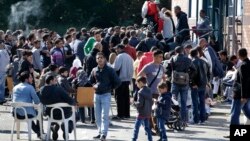The refugees arrive exhausted in Germany, are greeted and fed by waiting volunteers, then whisked away to reception centers around the country. It all seems as smooth as the assembly line in a BMW factory.
Behind this efficient welcome for asylum seekers, though, are scenes of chaos and confusion as Germany's famous orderliness is overwhelmed and officials scramble to keep up with the waves of newcomers spilling in from the Middle East.
Standard procedures like identification and registration are forgotten as most newcomers — Syrians, Iraqis, Afghans and any number of other nationalities — pass through cities like Munich on their way to a hoped-for new life elsewhere.
"People who arrive in Munich don't get registered here at all — they're distributed all over Germany," said Christoph Hillenbrand, senior administrator of the Upper Bavaria district around Munich.
Officials are buying so many bunk beds for refugee centers that local supplies are often exhausted and orders are made all the way to China. "IKEA can't keep up with the demand," he added, referring to the furniture chain store from Sweden.
Newcomers are told to register for refugee benefits at their final destinations within five days, but there is no way to check if they do it. Of about 25,000 arrivals over the weekend, only around 2,000 have stayed in Munich, he added.
Officials estimate almost 40 percent of those arriving this year come from the Balkans and most will be denied asylum, unlike Syrians deemed worthy of protection from their civil war.
Interpreters talking with the refugees say most speak Arabic, Persian or Pashtu. "But there are fake Syrians here as well, for sure," said Hillenbrand, meaning people claiming to be from Syria to improve their chances of gaining asylum.
Asked if this open door for refugees exposed Germany to any security risks, the Bavarian official simply replied: "Go ask the interior minister."
The refugees are quickly brought to shelters, often sports halls or schools hastily equipped with beds and tables, but nothing stops them from leaving to go anywhere they want.
"About 1,000 refugees have left shelters in Munich on their own in the past few days, probably moving on to relatives who are already here," Hillenbrand said.
"If they want official [refugee] status, they have to register within five days anywhere in Germany," he added. Only then will their identification be checked and their application for asylum be considered.
The usual registration procedure is so detailed that refugees would be stuck at the German-Austrian frontier for days or weeks if the bureaucracy insisted on checking them all first.
In normal times, asylum seekers are photographed and fingerprinted and have to show passports and any other official papers to prove their identity. If the Federal Office for Migration and Refugees has any doubts, it can run a technical analysis of the documents.
Asylum seekers can also be recorded speaking their native tongues. The Federal Office has 45 experts who can analyze speech patterns and accents in 80 languages to check if applicants have lied about where they come from.
This time, it is not just the apparent efficiency that has a flip side. The images of Germans applauding arriving refugees and passing out water and candies do too.
Right-wing politicians have complained about so many Muslims being let in.
Several refugee shelters have been attacked in recent weeks and fears fanned by reports such as one saying Saudi Arabia, which has taken in no refugees itself, has offered to build 200 mosques for those who make it to Germany.
In Berlin, residents have donated food that Islam says Muslims cannot eat and clothes it says women should not wear.
"We don't know what to do with the summer dresses, tank tops and miniskirts," a charity worker told the Tagesspiegel daily.





